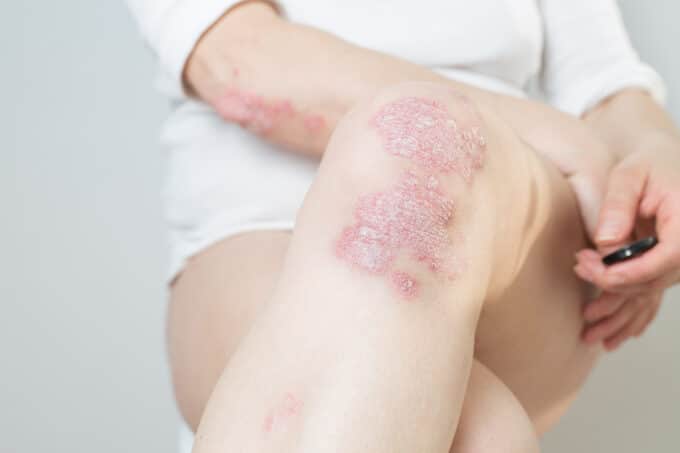How Can Psoriasis Be Diagnosed?

Psoriasis is an autoimmune, inflammatory skin disease that can also affect the joints. When this happens, it’s called psoriatic arthritis. Joints become painful and stiff, and there may be visible redness and swelling over the affected area.
An autoimmune disease is one that causes the body’s immune system to attack its own healthy tissue. The reasons for this are still not clearly and entirely understood. As a result, the causes of psoriasis are difficult to determine, but seeking a diagnosis can still help you get your life back.
Plaque Psoriasis
Psoriasis typically first appears in the teen or early adulthood years. There are different types, but the most common is called plaque psoriasis. This causes patches of thick, itchy, red, silvery scales called plaques to form on the skin, especially on the knees, elbows, and heels. However, psoriasis can appear anywhere there is skin, including the scalp and genitals.
Plaque patches tend to itch a lot. They may break open and bleed, only to partly heal and then break open again. Psoriasis is unsightly and causes social isolation issues for many of those affected.
Psoriasis is caused by a defect in the person’s immune system. It is not contagious, so there is no reason to fear a person with psoriasis. Nevertheless, it is chronic and can spread throughout an individual, meaning treatment and management are necessary.
How is Psoriasis Diagnosed?
An experienced physician can usually diagnose this condition by appearance, but it’s important to see a reputable specialist, like Dr. Baird, because this condition may be easily confused with other skin conditions like eczema. If confirmation is needed, Dr. Baird can do a skin biopsy. He will also consider other types of psoriatic symptoms, such as thick, ridged fingernails.
Your doctor will tell you what type of psoriasis you have. Besides plaque, there are:
- Guttate
- Inverse
- Pustular
In the guttate form, there are small droplets of psoriatic spots over a large area. These spots may be purple, pink, red, or brown depending on skin color.
Inverse psoriasis affects folds of skin, such as where the thigh meets the upper leg or under the breasts. This type looks like large areas of smooth, red skin and is easily irritated.
The pustular form presents as small pus-filled dots forming over swollen skin. This may easily be mistaken for a skin infection, but it’s not and can be very painful.
These types of psoriasis are uncommon– most people with this disease have the plaque form, but concern about another form can be discussed after your diagnosis. Your doctor will also classify your condition by the amount of skin area involved, from mild to moderate to severe.
Treatment of Psoriasis
Psoriasis has been notoriously resistant to treatment in the past, but certain treatment methods are able to target specific areas of the immune system to improve or even totally clear psoriatic skin temporarily. Psoriasis cannot be cured, but biological medications or ultraviolet light therapy can ease psoriatic joint pain and symptoms. You are encouraged to maintain your professional appointment with treatment options including topical creams and ointments.
Although not a proven therapy, an anti-inflammatory diet may help along with medical intervention. These diets typically include lots of fruits and vegetables and exclude refined sugars and flour, white rice, pasta, red meat, and processed foods.
Why Choose BairdMD
Dr. David A. Baird, MD, is a board-certified dermatologist serving the Farmington, MI area who is well-versed in medical skin treatments. Dr. Baird can both diagnose and treat your psoriasis, giving you long-awaited relief.
Baird, MD welcomes new patients and is here to offer comprehensive dermatology services, including skin cancer evaluation and treatment. If you’re concerned about psoriasis or any skin condition, just call us at 248-823-7122. A trained team member will answer your questions and can schedule a consultation. , or via our online contact and consultation form. We can’t wait to help you take control of your skin!

